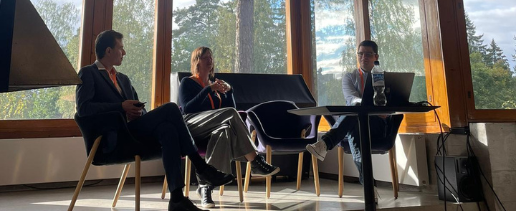
Last week, I attended MyData 2025 in Espoo, Finland. As my first in-person conference, it was a great learning experience, giving me a chance to deepen my understanding and make connections with people throughout the personal data community.
Wednesday began with a collaborative workshop hosted by the Data Transfer Initiative focusing on how tools, trust, and public engagement are key to data portability. It was a thought-provoking start to the conference, with participants working in groups to consider practical solutions to a complex problem.
The official opening of the conference celebrated 10 years of MyData, looking back at achievements and how the community has grown. It featured two powerful keynote addresses that set the tone for the days ahead. Max Schrems delivered a compelling talk on the failures of data protection enforcement. He presented statistics illustrating the high cost and low success rate of current litigation processes, arguing that meaningful accountability remains elusive under the current structures. His message was clear: a shift toward collective class action is essential to effectively challenge and address the widespread rights violations of big tech companies.
Following this, Damian Collins, former junior Minister for Tech and the Digital Economy, offered a candid reflection on the growing “techlash” that followed scandals like Cambridge Analytica. He warned against the government trading digital rights for the economic benefits promised by large US tech companies. Instead, he strongly advocated for transparency as a cornerstone of digital trust, emphasising the critical role of policy in protecting and promoting best practice among big tech firms.
The final session of the day was a practical workshop using Estonia as a case study for personal data spaces as part of public infrastructure. The evening concluded with pizza and a traditional Finnish sauna, a unique and enjoyable setting that encouraged relaxed, meaningful conversations to continue.
Thursday began with an insightful panel led by Chris Riley about personal AI, which examined the importance of portable AI.
The afternoon saw Jesse Wright, the ODI’s Project lead for Solid, present: "The Future of Solid: ODI’s Vision and Roadmap". The room was full of implementers, developers, policy experts, and others from across the ecosystem. Many in the crowd were already familiar with Solid - and excited to learn about how in the coming years we will see:
- Pilot projects across healthcare, government, education, and community sectors, each showing how people can take back control of their data.
- Training for developers, equipping them to build applications on top of Solid’s infrastructure.
- Opportunities for start-ups and small enterprises to develop services without being locked into proprietary platform, and
- Preparation for an AI-driven future, where Solid ensures that intelligent systems work with your data under your permission, rather than extracting it without your say
Jesse's presentation clearly explained the origins and technical underpinnings of the Solid standard, and demonstrated the standard itself. He emphasised ODI’s role as steward of the standard, and how the partnership gives Solid a “home for research, development, and strategic leadership.” He outlined the roadmap for implementation, which was well-received, particularly the focus on educational materials and future case studies.
After the session, we heard from Elfi Goesaert and Brecht Wyns, Solid implementers, who shared practical insights about how the standard has enabled their work. Chris Riley closed the session with insight about the compatibility of Solid and the Data Transfer Initiative. Friday began with Jesse’s panel on Data Spaces, joined by Sebastian Steinbuß, Maaria Nuutinen, and moderator Viivi Lähteenoja. The panel explored how complementary frameworks like Solid and IDSA can be connected to build secure, interoperable ecosystems. In particular, Solid provides the technical infrastructure for dataspaces with personal data — including standards for data models, data exchange, access control, and identity. Jesse closed the discussion by saying, “Solid and IDSA nicely dovetail together, with respective technical and governance architectures that make data work for you.”
Later, I attended a fascinating session on AI and geopolitics, which evolved into a lively debate about local vs. big tech discussing whether it's time to move toward local browsers and decentralised applications.
The conference ended with an awards ceremony celebrating those who’ve made outstanding contributions to the community. MyData 2025 was full of insightful discussion, debate and solutions. The MyData community is welcoming and driven to make positive action.